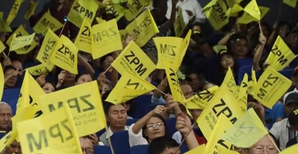Aizawl: The recent scintillating victory of the Zoram People’s Movement (ZPM) in the Mizoram Assembly polls has further established the regional parties’ domination in northeast politics.
Of the eight states, four states – Meghalaya, Mizoram Nagaland and Sikkim – have been dominated by the regional parties mostly due to the declining strength and organisational weaknesses of the Congress, which once governed most of the states of the region.
The National People’s Party (NPP) led by Chief Minister Conrad K. Sangma dominating the Meghalaya Democratic Alliance government, the Nationalist Democratic Progressive Party (NDPP) led by Chief Minister Neiphiu Rio heading the United Democratic Alliance (UDA) government in Nagaland and the Sikkim Krantikari Morcha (SKM) led by Chief Minister Prem Singh Tamang, though are allies of BJP-led NDA, but these parties have strong bases in their states.
Mizoram Chief Minister and ZPM supremo Lalduhoma has already announced that his party would not be a partner of the NDA or Opposition’s INDIA bloc; and will give issue-based support to the national parties.
The November 7 Mizoram Assembly polls were a political test for the anti-Congress Northeast Democratic Alliance (NEDA) led by Assam Chief Minister Himanta Biswa Sarma as both the BJP and NEDA ally Mizo National Front (MNF) bitterly fought against each other.
The ZPM, which was registered as a political party in 2019, voted out the Mizo National Front government in the polls, securing 27 seats in the 40-member Assembly.
The four-year-old party got eight seats in the 2018 Assembly polls when its candidates contested the elections as independents.
The BJP, which got one seat in the 2018 polls, managed to win two seats this time and the Congress, which governed Mizoram for more than 22 years in different terms since 1984 under the Chief Ministership of party stalwart Lal Thanhawla, performed disastrously and secured only one seat.
The Congress fielded candidates in all 40 seats. However, only C. Ngunlianchunga, the party’s candidate from Lawngtlai West seat, could win the election. His victory margin was 432 votes.
In the 2018 elections, the MNF bagged 26 seats, but the militant outfit turned political party this time bagged only ten seats.
Before the 2023 polls, Mizoram was governed only either by Congress or by the MNF since it became the 23rd state of the country on February 20, 1987, after the signing of the Peace Accord in 1986 ending two decades of strife and insurgency.
Mizoram also scripted history in the 2023 polls as for the first time, three women candidates were elected to the 40-member Assembly in one go.
ZPM candidate Lalrinpuii won from Lunglei East constituency and her party colleague and television presenter Baryl Vanneihsangi was elected from Aizawi South-3 seat.
The relations between the BJP and the just-ousted MNF sharply deteriorated after the saffron party-led NDA mooted the Uniform Civil Code (UCC) as well as the ethnic violence in Manipur which erupted on May 3.
The MNF accused both the BJP-led Central and the state governments of “failing to protect the Kuki-Zo-Chin tribals in Manipur”.
Around 13,000 Kuki-Zo-Chin tribals, including women and children sheltered in Mizoram after being displaced from Manipur, where the ethnic riots between Meitei and Kuki-Zo-Chin broke out around eight months ago.
Political pundits said that like MNF, the ruling ZPM would also oppose the UCC and take a similar stand in dealing with the refugees from Myanmar, Bangladesh and Manipur.
(Sujit Chakraborty can be contacted at sujit.c@ians.in)
–IANS


Comments are closed.